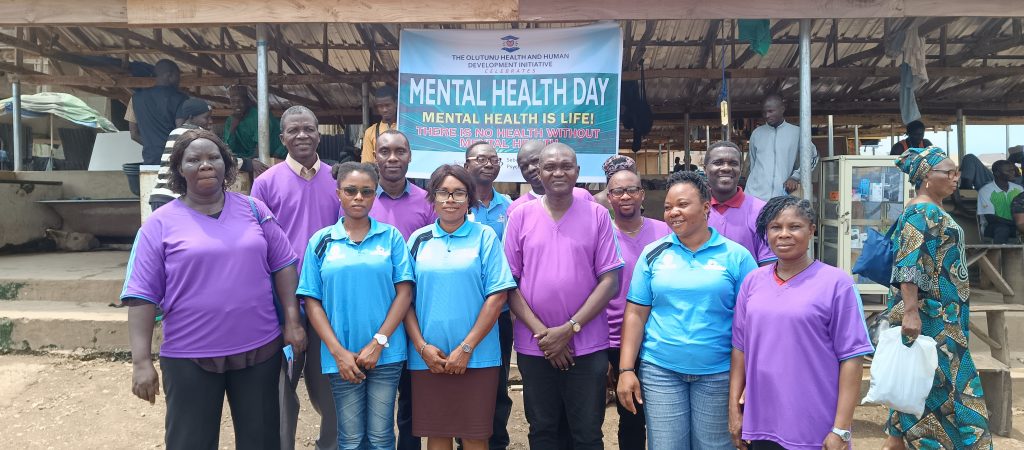As Nigeria joins the world to mark this year’s World Mental Health Day, an expert has raised concerns about the country’s ongoing economic struggles as a key contributor to rising cases of mental health disorders.
Dr. Sunday Amosu, Head of Research and Training at the Neuropsychiatric Hospital, Abeokuta, stated this on Wednesday, at an outreach event organised by the Olutunu Health and Human Development Initiative held at Olomore Market in Abeokuta, ahead of the global observance.

Amosu highlighted that Nigeria’s economic realities are causing significant stress for many individuals, which in turn, is manifesting in mental health problems.
He said “the economic challenge is real, and it’s a major cause of mental illness,” he stated.
“It’s essential for people to manage their lives within their financial means.
“There’s no need to compare yourself with others; if you can’t afford private school for your children, enrol them in government schools. This is one way to reduce mental stress.”

The outreach event was held as part of a series of activities in celebration of World Mental Health Day, which is commemorated annually on October 10.
According to Amosu, the importance of mental health cannot be overstated.
“Health is not complete without mental health. We’ve seen a reawakening on this issue since 2013 when we began marking this day,” he said.
This year’s theme, “Prioritising Mental Health in the Workplace,” focuses on the vital connection between mental well-being and productivity.
Amosu explained that mental health issues can significantly impact workplace performance, stressing the need for employers to be more sensitive to the psychological needs of their staff.
“There’s a strong relationship between work and health. Poor working conditions can lead to mental health problems, and in turn, mental health issues affect productivity.
That’s why this year’s theme is so important,” Amosun stated.
He also urged employers and managers to be more considerate of their employees’ mental health needs.
“If you see a subordinate struggling, even if they don’t say anything, observe their behaviour. Are they sleeping well? Are they dealing with stress?
“As a boss, are you the cause of their stress? Denying someone leave or help when it is within your power can exacerbate mental health problems.”
Amosun further explained that an individual’s productivity is closely tied to their mental health.
“Without mental health, people can’t be productive, and this affects not only the workplace but the entire society. If individuals suffer, the whole country suffers,” he added.
A key warning sign of poor mental health, Amosu noted, is sleep disturbance. “The earliest indication of mental health issues is usually poor sleep.
“Adults need about six to eight hours of uninterrupted sleep. If someone struggles to fall back asleep after waking, it’s a sign that something may be wrong,” he warned.
He encouraged anyone experiencing sleep problems to seek professional help promptly, as mental health issues, like other chronic illnesses, require early intervention and ongoing follow-up.
Amosu advised Nigerians to avoid harmful behaviours that could worsen their mental health, particularly the use of hard drugs.
He urged people to be mindful of how they spend their leisure time and the company they keep, as both factors can influence their mental well-being.
…. NGO Targets Mental Health Advocacy, Stigma Reduction

Speaking during the outreach, Mrs. Salako Olawunmi-Larry, Assistant Director at the Neuropsychiatric Hospital, Abeokuta, and a social worker, emphasised the critical role of mental health advocacy in reducing the stigma associated with mental illness.
According to her, the public often views mental health conditions as incurable, a perception that discourages individuals from seeking treatment or supporting those affected.
“We are here through the platform of the Olutunu Health and Human Development Initiative, an NGO focused on advocacy.
“Our target is to work on prevention, especially in the area of mental health. This is why we are committed to educating and sensitising the community,” Mrs. Salako said.

She lamented the widespread stigma that surrounds mental illness in society, noting that the negative perception often leads to neglect, even by family members.
Comparing the treatment of mental health patients to those suffering from physical illnesses such as cancer and HIV, she observed that while relatives offer support and care to patients with physical ailments, they often abandon those with mental health issues.
“When you visit a general hospital, you will see patients with cancer or HIV surrounded by their families, hoping and praying for their recovery.
“But when it comes to mental health, family members are reluctant to take responsibility.
“We’ve had cases where relatives refused to pick up their loved ones after treatment, and in some instances, they refused to collect the body after the patient had died,” she explained.
Addressing this issue, Mrs. Salako emphasised that mental illnesses are treatable, and those affected should not be ostracized.
“The stigma attached to mental illness is what we are working to address. People with mental health conditions should not be abandoned or stigmatised. They need love, care, and support, just like any other patient,” she said.
She highlighted the burden of care as a significant challenge for families of individuals living with mental illness.
Many homeless individuals with mental health issues, according to her, have families who have chosen to turn away due to the cost and emotional strain of providing care.
While the government has a role to play in addressing these challenges, she stressed the importance of community involvement and support.
“Assisting anyone with mental illness is a heavy burden for families. That’s why you see many of them on the streets. But we can help from our end.
“When we see someone struggling in our community, we can come together to support them. This used to be part of our culture, but civilization is gradually eroding these values,” she noted.
The outreach programme also emphasized the need for financial support to expand the NGO’s work.
Mrs. Salako called on well-meaning individuals and organizations to contribute to the cause, enabling the NGO to reach more people in need.
“While the government has its responsibilities, as an NGO, we rely on financial support from the public to reach as many people as possible.
“ In the Olutunu Health and Human Development Initiative, we are not just health workers. We have artisans, teachers, students—people from all walks of life—working to advocate against the stigma attached to mental illness,” she said.
The outreach at Olomore Market is part of a broader campaign by the Olutunu Health and Human Development Initiative to promote mental health awareness, provide education on preventive measures, and collaborate with other NGOs to assist homeless individuals living with mental illness.
Do you want to share a story with us? Do you want to advertise with us? Do you need publicity for a product, service, or event? Contact us on WhatsApp +2348183319097 Email: platformtimes@gmail.com
We are committed to impactful investigative journalism for human interest and social justice. Your donation will help us tell more stories. Kindly donate any amount HERE






